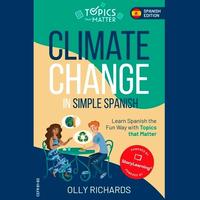CAPÍTULO 18: CULTIVAR UN HUERTO
KAPITEL 18: GARTENARBEIT
CHAPTER 18: GROWING A GARDEN
ROZDZIAŁ 18: OGRODNICTWO
CAPÍTULO 18: CULTIVAR UN HUERTO.
|||garden
CHAPTER 18: GROWING A GARDEN.
David consulta su reloj.
|checks||
David checks his watch.
Tiene otros pacientes esperándolo.
|||waiting for him
He has other patients waiting for him.
David: Una cosa más, chicas: hemos hablado mucho sobre la dieta, pero antes de iros, deberíamos hablar sobre el ejercicio físico.
||||||||||||||go away||||||
David: One more thing ladies, we've talked a lot about diet, but before we go, we should talk about exercise.
Julia: ¡Oh, sí!
Julia: Oh, yes!
En esto yo voy mejor que tú, Yoko.
I'm better at this than you, Yoko.
David: ¿Todavía vas a nadar tres veces por semana en la piscina municipal?
|Still|||||||||||
David: Do you still go swimming three times a week at the municipal pool?
Julia: ¡Sí!
Los días que no nado, salgo a pasear.
|||||||to walk
On the days that I don't swim, I go out for a walk.
Yoko: ¡Le encanta hacer ejercicio!
|||to do|
Yoko: She loves to exercise!
David: ¿Y a ti, Yoko?
¿A ti no te gusta nadar o pasear?
You don't like swimming or walking?
Yoko: ¡Para nada!
Yoko: Not at all!
Julia: Ella no hace ejercicio si no tiene una razón para ello.
Julia: She doesn't exercise if she doesn't have a reason for it.
David: ¿Qué pensarías si te digo que hay una forma de hacer ejercicio que también ayudará a Julia a comer mejor?
||you would think||||||||||||||||||
David: What would you think if I told you that there is a way of exercising that will also help Julia eat better?
Yoko: ¡Vaya, vaya; eso me interesa!
Yoko: Wow, wow; that interests me!
¿Tiene usted alguna idea, Dr. Pizarro?
Do you have any ideas, Dr. Pizarro?
David: ¡Sí!
¿Qué te parece cultivar tus propias verduras en un huerto?
How about growing your own vegetables in a garden?
Julia: ¡Yoko, es una idea maravillosa!
David: Cuidando un huerto se hace mucho ejercicio.
|Taking care of||||||
David: Taking care of a garden requires a lot of exercise.
¡Y si cultivas verduras y frutas, también comerás mejor!
||you grow|||||you will eat|
And if you grow vegetables and fruits, you will also eat better!
Julia: Hablamos sobre huertos en la última reunión de la asociación ecologista.
|||gardens||||||||
Julia: We talked about orchards at the last meeting of the environmental association.
Los huertos son muy buenos para el medio ambiente.
Gardens are very good for the environment.
David: ¿En qué sentido?
David: In what way?
Julia: Primero, puedes elegir no usar productos químicos en el suelo y abonar tus plantas con compost.
||||||||||||fertilize||||compost
Julia: First, you can choose not to use chemicals in the soil and compost your plants.
David: ¿Y qué es el compost?
David: And what is compost?
Yo siempre pienso en cáscaras de plátano y posos de café.
||||peels||||grounds||
I always think of banana peels and coffee grounds.
Julia: Cualquier desecho que proceda de las plantas puede convertirse en compost.
||waste||comes|||||||compost
Julia: Any waste that comes from plants can become compost.
¡Eso incluye las cáscaras de plátano y los posos de café!
|||peels|||||||
That includes the banana peels and coffee grounds!
También puedes usar hojas y malas hierbas del jardín.
|||leaves|||||
You can also use leaves and weeds from the garden.
El compost se obtiene cuando la materia vegetal se pudre y se descompone.
|||||||||rots|||decomposes
Compost is made when plant matter rots and decomposes.
David: ¿No huele mal?
David: Doesn't it smell bad?
Julia: ¡Ja, ja, no; no huele bien, eso es cierto!
Julia: Ha ha no; it doesn't smell good, that's true!
Es por eso que muchas personas guardan el compost fuera de casa.
||||||keep||compost|||
This is why many people keep compost outside the home.
Pero es muy saludable para el suelo; a tus plantas les encantará.
|||||||||||will love
But it is very healthy for the soil; your plants will love it.
Yoko: ¡Guau, Julia!
Yoko: Wow, Julia!
¡Sabes mucho de agricultura y jardinería!
|||agriculture||
You know a lot about farming and gardening!
Julia: Sí, aunque no me gusta.
Julia: Yes, although I don't like it.
¡Por eso nunca se me había ocurrido hacerlo en casa!
||||to me|||||
That's why it had never occurred to me to do it at home!
Pero es perfecto para ti.
But it's perfect for you.
Yoko: ¡Gracias por la sugerencia, doctor!
Yoko: Thanks for the suggestion, doctor!
David: De nada, pero también debo darte las gracias a ti, Julia.
David: You're welcome, but I must also thank you, Julia.
¡Ahora que sé lo bueno que es para el medio ambiente, yo también quiero tener uno!
Now that I know how good it is for the environment, I want to have one too!
Julia: ¡Me encanta oír eso!
Julia: I love hearing that!
Yoko: Bueno, tenemos que seguir haciendo cosas.
Yoko: Well, we have to keep doing things.
¡Adiós, doctor Pizarro!
David: ¡Adiós, chicas!
David: Bye, girls!

